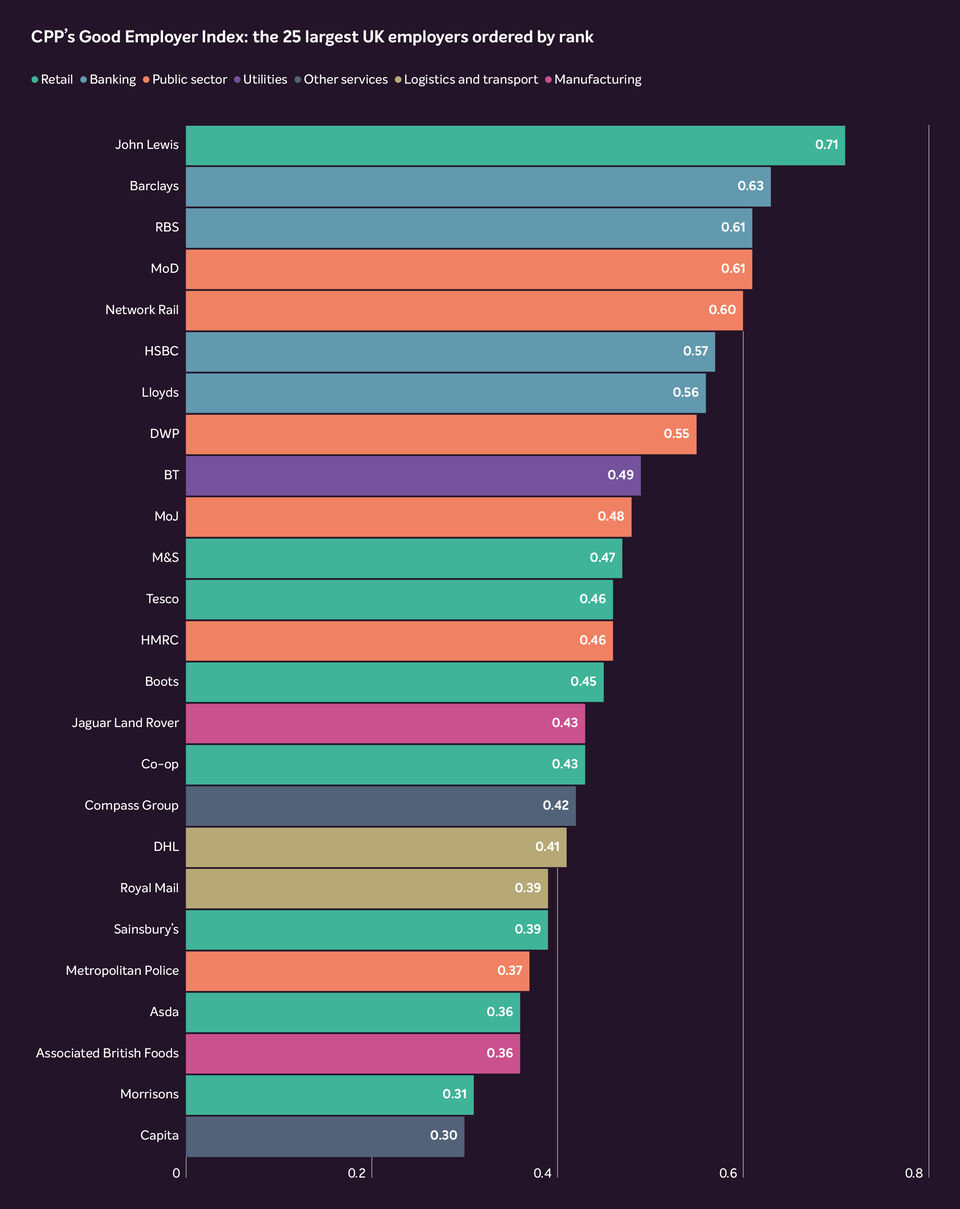The good life: the role of employers
Measuring employers' contribution to inclusive growth
21 November 2019
5 minute read
This report is the third output of the partnership between the Centre for Progressive Policy (CPP) and the All-Party Parliamentary Group (APPG) on Inclusive Growth, measuring inclusive growth at the country, community and employer level. Taken together, this series of reports delivers the most comprehensive set of measures yet on the multidimensional nature of inclusive growth.
Good employment is a critical component of inclusive growth. A working individual’s consumption will be affected by their pay, their leisure by their working hours and their health by their working conditions, stress levels and sense of purpose. We know that we need to create quality jobs with opportunities for training and progression and which give people voice. Good employment matters for both businesses and communities, providing a platform for people to contribute to, and benefit from, increased productivity and shared prosperity.
This report identifies the extent to which the UK’s largest employers are providing good jobs and inclusive employment. To do this, CPP’s Good Employer Index brings together data from multiple publicly available sources to rank the 25 largest UK employers – accounting for 2.3 million workers – on the extent to which they are providing good employment. The index both allows us to hold our largest employers to account and provides a framework for businesses and the public sector to assess the performance of themselves and others.
This final report in the series of measuring inclusive growth at shows what we should expect from employers and how we can hold them to account to achieve shared economic prosperity.
How does your employer perform in the index? Our online tool enables you to calculate the good employer score for an organisation you are interested in.
Need help finding the data? Take a look at our how to guide.

Key findings:
Only four of the largest 25 employers pay the real Living Wage. The real Living Wage is calculated by the Living Wage Foundation (LWF) according to how much employees and their families need to live. There are over 5,000 living wage organisations but only four of the 25 largest employers – the banks HSBC, Lloyds, Barclays and RBS – are signed up to pay it. By contrast, these banks have the four highest gender pay gaps of the 25.
Public sector employers tend to score more highly, but private companies top the index. The six public sector organisations in our index tended to have higher than average good employer scores, however, the top three are all private sector companies. In particular, top to median pay ratios were much lower for public, compared to private, sector employers: public sector pay ratios reached a maximum of 15 (Network Rail) whereas the maximum private sector pay ratio was nearly 400 (Compass Group). Public sector performance on contract violations and employee review measures is more mixed.
Whilst sector is important, it only explains a third of the differences between organisations. Both the retail and public sector are spread across the rankings with John Lewis and the Ministry of Defence coming at the top in contrast to Morrisons and Metropolitan Police which both rank towards the bottom of our index.
Voluntarily reporting CEO pay ratios is a particularly good indicator of whether an employer ranks highly on our index. Next year companies will be legally required to report their top to median pay ratio. We found that employers who voluntarily reported the metric this year did significantly better on other aspects of our index, suggesting that transparent employers tend to be better employers. A key virtue of our index is that it is applicable to all large employers, not just those who opt in and therefore may already be transparent.
CPP are calling for:
Public sector organisations to require prospective contractors to submit employment practice information as part of the procurement process, ensuring public money is used to support good employment (the data is already collected so adds no additional burden to business).
BEIS to improve transparency by:
- restarting the non-compliance naming scheme for organisations that violate minimum wage regulations
- ensuring that company structures are published on Companies House
- requiring employers to publish the contract types of their workforce
- implementing the Taylor Review recommendations on reporting workforce structure through existing staff surveys
Local leaders to use the measurement framework to enforce local business charters and hold public procurement contractors to account.
Businesses in the index to reflect on their ranking and how they can improve their employment practices.
All other businesses to use CPP’s online tool to check their own employer practices.
Interactive results
Choose an employer in the blue cell below to view their score, and the breakdown of measures that support this.